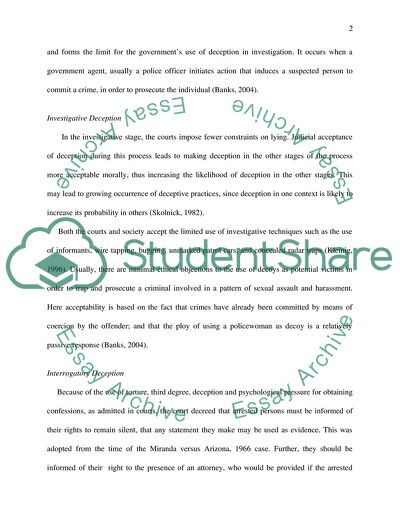
- Home
- Free Samples
- Premium Essays
- Editing Services
- Extra Tools
- Essay Writing Help
- About Us
- Studentshare
- Subjects
- Miscellaneous
- Deception in the Investigative, Interrogative and Testimonial Processes
Deception in the Investigative, Interrogative and Testimonial Processes - Essay Example

- Subject: Miscellaneous
- Type: Essay
- Level: Undergraduate
- Pages: 4 (1000 words)
- Downloads: 0
- Author: jernser
Extract of sample "Deception in the Investigative, Interrogative and Testimonial Processes"
The acceptability of deception varies according to the stage reached in the criminal justice process. The police and the courts find deception to be most acceptable at the investigation stage, less acceptable during interrogation, and least acceptable in the courtroom. This is based on the fact that each stage in the criminal justice process implies a greater number of constraints. For instance, testimony that is given in the court is under oath, but that given in the process of interrogation is not (Skolnick, 1982).
Another process is the practice of entrapment which includes operations such as surveillance, undercover investigations, and entrapment itself, which are covert activities involving deception of one form or the other. In the United States, entrapment can be used legally to a certain extent, and forms the limit for the government’s use of deception in investigation. It occurs when a government agent, usually a police officer initiates action that induces a suspected person to commit a crime, in order to prosecute the individual (Banks, 2004).
In the investigative stage, the courts impose fewer constraints on lying. Judicial acceptance of deception during this process leads to making deception in the other stages of the process more acceptable morally, thus increasing the likelihood of deception in the other stages. This may lead to growing occurrence of deceptive practices, since deception in one context is likely to increase its probability in others (Skolnick, 1982). Both the courts and society accept the limited use of investigative techniques such as the use of informants, wire tapping, bugging, unmarked patrol cars, and concealed radar traps (Kleinig, 1996).
Usually, there are minimal ethical objections to the use of decoys as potential victims in order to trap and prosecute a criminal involved in a pattern of sexual
...Download file to see next pages Read MoreCHECK THESE SAMPLES OF Deception in the Investigative, Interrogative and Testimonial Processes
Deception by the Investigating Officer
Deception within the Criminal Justice System
Police Deception during Interrogation
Investigative, Interrogation, And Testimonial Processes During The Process Of Law
Deception in Criminal Justice
Wrongfully Convicted
Deception in the Investigative, Interrogative, and Testimonial Processes
Using Eyewitness Evidence in Criminal Investigations

- TERMS & CONDITIONS
- PRIVACY POLICY
- COOKIES POLICY